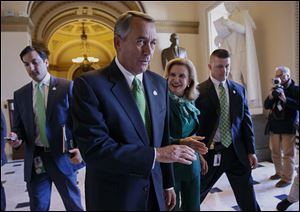
Boehner questions Senate unemployment deal
3/14/2014
House Speaker John Boehner of Ohio leaves the House chamber on Capitol Hill in Washington, today.
WASHINGTON — House Speaker John Boehner questioned the feasibility of a bipartisan Senate deal to renew expired benefits for the long-term unemployed, a remark that seemed to suggest the agreement could be in trouble in the House.
Asked today by The Associated Press what he thought of the Senate compromise, he said, “You mean the one that can’t be implemented?”
He gave no details about what the problem might be. An aide did not immediately provide further explanation.
Asked if his comment meant he didn’t like the measure or that he wouldn’t bring it to the House floor for debate, Boehner, R-Ohio, said, “I didn’t say that.”
Senators from both parties said Thursday they had reached a roughly $10 billion compromise that would renew emergency jobless benefits that ended Dec. 28. Coverage would be retroactive to that date and would last for five months, meaning it would run through May.
The emergency benefits are for people who have exhausted their regular state unemployment coverage, which generally lasts 26 weeks. So far, just over 2 million people out of work for at least half a year are not getting emergency benefits because the program expired.
When the emergency program expired in late December, it ignited partisan warfare over an issue that fit neatly into the parties’ campaign-season competition over which was best creating jobs and helping families still struggling to right themselves after the Great Recession of 2007-2009.
Democrats, backed by President Barack Obama, said opposition by most Republicans to extending the emergency benefits underscored GOP indifference to financially stressed Americans, while Republicans said they wanted an extension to be paid for and to improve federal job programs.
In December, Boehner said Republicans would consider extending emergency benefits “as long as it’s paid for and as long as there are other efforts that will help get our economy moving once again.”
Approval seems likely in the Democratic-run Senate after Congress returns from a weeklong recess in late March.
The measure will need 60 Senate votes to overcome Republican procedural tactics aimed at killing it. But with Democrats having 55 votes — including those of two usually supportive independents — supporters seemed to have a strong chance of reaching that threshold because five Republicans co-sponsored the announced deal.
They are Sens. Dean Heller of Nevada, Susan Collins of Maine, Rob Portman of Ohio, Lisa Murkowski of Alaska and Mark Kirk of Illinois.
Heller, a leader in the talks that led to Thursday’s Senate compromise, said the agreement “will finally give Americans certainty about their unemployment benefits.”
Sen. Jack Reed of Rhode Island, the leading Democratic bargainer, said the deal would help families and show “business and the markets that Congress is capable of coming together to do the right thing.”
Rhode Island had an unemployment rate in December of 9.3 percent and Nevada’s was 9 percent — the two worst rates in the nation.
White House spokesman Jay Carney noted that Obama has called on Congress repeatedly to approve an extension and said, “This is not just the right thing to do for these Americans looking for work, it’s the right thing to do for our economy.”
Lawmakers said the proposal was fully paid for, with the bulk of the money raised by extending some customs fees through 2024 and delaying some companies’ contributions to their pensions, in effect increasing their taxes now but reducing them later. More federal revenue would be raised by letting some companies make earlier payments to the Pension Benefit Guaranty Corp., which guarantees workers’ pensions.
The deal would end jobless payments to people earning more than $1 million a year. The lawmakers cited 2010 data showing that 0.03 percent of taxpayers earned over $1 million and received some form of federal or state unemployment benefits.
The agreement also has a provision aimed at improving programs that help the long-term unemployed find new jobs and strengthening how the government verifies that they are eligible for unemployment benefits and assistance in finding jobs.
Jobless Americans can qualify initially for state-sponsored unemployment benefits, which generally run for 26 weeks. After that, they can receive emergency federal coverage that lasts from 14 weeks to 47 weeks, depending on how high unemployment is in their state.
When the emergency program expired Dec. 28, 1.3 million people immediately lost those benefits. Since then, an average of 72,000 people weekly exhausted state benefits and could not receive emergency coverage, according to the liberal National Employment Law Project, bringing the current total to just over 2 million.
Average weekly emergency benefits last year were $287, the group said.